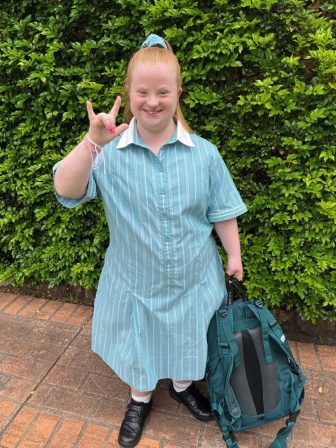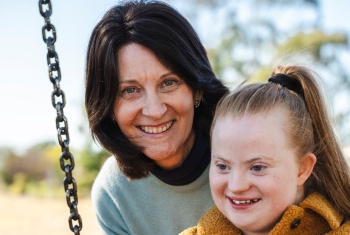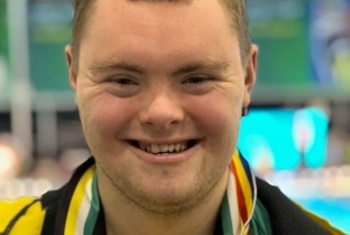Since Alyssa Cotterill’s very first day of school, she would make the ‘I love you’ sign to her mum, Melissa, each morning at drop-off.
As she embarks on her final year of high school, for Alyssa, who has Down syndrome, the sign remains as a symbol of their love.
‘This sign goes back to when I first taught Alyssa sign language when she was a baby,’ Melissa said.
‘Alyssa no longer needs to sign. She talks now, but we have beautiful memories of our signing days. We've kept this sign, which makes both of us very happy.’
The NDIS participant, from Sydney, is looking forward to reuniting with friends and school staff, with an eye on preparing for life after school.
While finishing Year 12, Alyssa will continue her work experience at a local office doing jobs such as scanning documents and taking coffee orders.
Alyssa, 17, has the full support of her family, including her dad, Michael, and 3 sisters, as she navigates her way through Year 12.
‘Our family talks regularly to Alyssa about all the exciting milestones she will achieve this year, such as turning 18, leaving Year 12, and finding a job,’ Melissa said.
‘Our plan is to get her registered with a disability employment agency to help her find a job and work on her independence.’
Alyssa’s NDIS plan includes speech and occupational therapy, exercise physiology and a support worker.
‘The NDIS helps Alyssa to have a full life. Her supports assist Alyssa to achieve her goals so she is more independent,’ said Melissa, who works for Down Syndrome New South Wales.
Its Inclusive Education Program connects parents like Melissa with others in the Down syndrome community and provides educational resources and workshops.
The organisation also runs the Up, Up and Away social club for teenagers, which Alyssa enjoys. She will join its Up Club! for adults when she turns 18 later this year.
‘This will be exciting for her to move up to the adult group,’ Melissa said. ‘These are both great social programs for networking and having fun.
‘Alyssa wants to be able to talk to people like she talks to family. She wants to be able to answer questions confidently.
‘A speech therapist helps Alyssa to improve her social skills and her ability to make friends.
So we’ve got a support worker who helps her with getting out in the community.
The occupational therapist helps Alyssa with strength and fine motors skills, such as handling cutlery.’
According to Down Syndrome Australia, about 1 in every 1100 babies born in Australia will have Down syndrome.
The NDIS supports 11,617 people with a primary disability of Down syndrome, 2% of all participants.
Latest NDIS data shows of participants aged 15 to 64 with Down syndrome, 26% had paid employment.
Melissa hopes for Alyssa’s growing independence to lead to a paid job and to be able to have great friends around her.
‘Balancing finding a job with social activities is an absolute priority,’ Melissa said. ‘As her parents, Michael and I want the very best for Alyssa so she can live life to the fullest and be everything she’s meant to be.’



